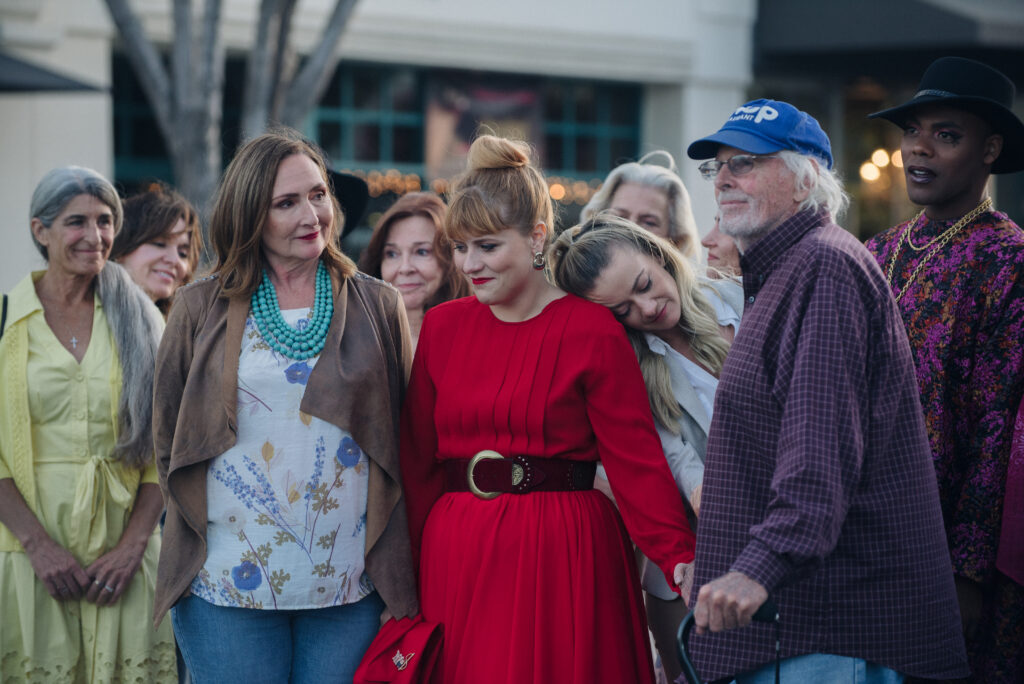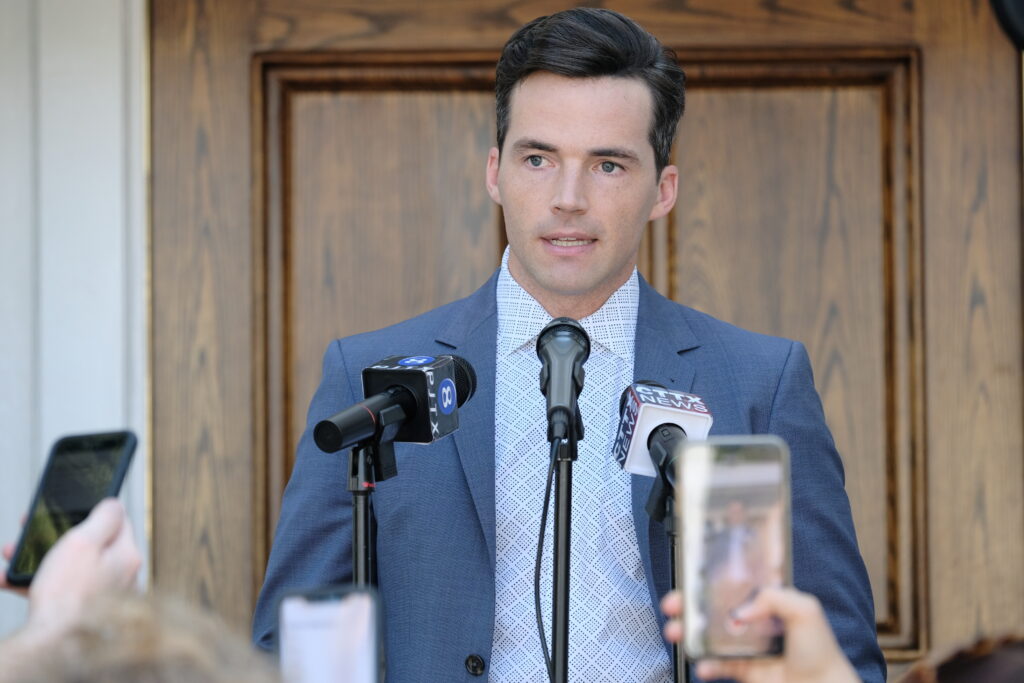March 25, 2022
by Carla Hay

Directed by Joey Ally
Culture Representation: Taking place in the fictional city of Alabaster, Texas, in 2020, the comedy/drama film “The Hater” features a predominantly white cast of characters (with a few African Americans and Asians) representing the working-class, middle-class and wealthy.
Culture Clash: A progressive liberal Democratic campaign worker goes back to her politically conservative Texas hometown and poses as a conservative Republican in a state representative primary election, in order to defeat a politician who bullied her when they were children.
Culture Audience: “The Hater” will appeal primarily to people interested in political dramedies and who have a high tolerance for watching abrasive personalities.

Once you get past all the obnoxious ranting by the movie’s main character, “The Hater” is a comedy/drama that has as much to say about political and cultural wars in America as it does about family, female empowerment and the grieving process. It’s not a film that everyone is going to like, simply because the protagonist is a loud, aggressive and unapologetically liberal “social justice warrior.” However, “The Hater” is not a movie that completely bashes political conservatives, who are presented not as a monolith but as people who have beliefs that vary within conservative ideology. The movie has some sly commentary about political campaigns and how candidates of any political leaning are capable of giving in to corruption.
Joey Ally is the star of “The Hater,” which is her feature-film debut as a writer/director. In the movie, she plays Dorothy Goodwin, a political junkie who has been obsessed with politics since she was a child growing up in the fictional city of Alabaster, Texas. The movie opens with a flashback to Dorothy at about 11 or 12 years old (played by Elizabeth Kankiewicz) giving a campaign speech to an assembled group of students in her bid to run for class president. She earnestly talks about civic-minded duties, and she quotes Thomas Jefferson. The students seem bored or downright hostile to Dorothy’s speech.
Dorothy’s opponent is rich kid Brent Hart (played by Wesley Kimmel), who shouts: “I want to be class president so we can have [French] fries all day, every day!” The crowd cheers, while Dorothy is shown looking dismayed at the side of the stage. Needless to say, Dorothy lost the election. And it’s later revealed through conversations in the movie that Brent bullied her when they were in school together.
“The Hater” then flash forwards to the year 2020, with Dorothy as an adult in her late 20s or early 30s. She’s a speech writer for a Democratic political candidate named Scott Park (played by Rob Yang), who has to bail her out of jail because she’s been arrested during an environmental protest where she and other protestors wore pig masks and chanted, “Trees not greed!” The video of her arrest went viral, and Scott isn’t pleased about how her arrest will affect his political campaign. Scott hints that he wants to fire Dorothy, but before he goes through with it, Dorothy decides to quit.
Feeling adrift and rejected, Dorothy decides to fly back to her hometown of Alabaster and stay at the house that she co-owns with her widowed paternal grandfather Frank Goodwin (played by Bruce Dern), who lives alone at the house. Frank is a curmudgeonly political conservative who regularly watches Fox News. Dorothy inherited the house from her late father Theodore “Ted” Goodwin, who raised her as a single parent. Dorothy’s mother is never seen or mentioned in the movie.
Frank is the type of person who uses sarcasm to express himself. When Dorothy shows up unannounced at the door, Frank pretends to disapprove of Dorothy’s nose ring and slams the door in her face. Just as Dorothy is about to remove the nose ring, Frank opens the door and chuckles that he was just messing with Dorothy, whom he hasn’t seen in about a year.
“I didn’t know if you were even alive,” Frank tells Dorothy. “I never thought I’d see you again.” Dorothy says about Frank’s remark: “It’s a little dramatic. I was home last year for your birthday.” Dorothy is a Democrat who works on political campaigns, but she also shows signs that she distrusts the government. She lectures Frank about not leaving “digital thumbprints” because of “all the data the government is collecting” on people.
It’s never really said outright, but observant viewers will figure out that Dorothy left her hometown behind and cut off contact with a lot of people she knows there because of too many bad memories for her. Not only was she bullied in school, but she’s also emotionally wounded by the death of her father, who was a schoolteacher who taught theater classes. Dorothy and Ted were very close. His cause of death is not mentioned in the movie, but it happened when she was a child. It’s implied that he was the one who influenced her to become politically liberal in a place that is mostly politically conservative.
“The Hater” makes several references to the fact that the movie is taking place in 2020. Without mentioning his name, Dorothy is extremely upset with who is president of the United States. There are mentions of the COVID-19 pandemic and the lockdowns that happened as a result. People aren’t wearing a lot of face masks because Texas is a state well-known for having a large population of people who are against wearing face masks during the pandemic and who protest against any government-ordered pandemic lockdowns.
Unemployed and looking for work on a political campaign, Dorothy doesn’t have much luck finding any paying jobs, so she reluctantly decides to become a campaign volunteer for a Democrat running to be a state congressional representative. Her name is Sally Jensen (played by Melora Walters), who has run for this political office before but has always lost. However, Dorothy nixes those volunteer plans when she finds out that her former school nemesis Brent Hart (played by Ian Harding) is Sally’s Republican opponent in the primary election. Dorothy comes up with a plan to ensure Sally’s victory.
Dorothy remembers a loophole in Texas state law that says that if a candidate wins a primary election, and then drops out of the general election, there can be no other candidate from the candidate’s political party to be in the general election. Because American political elections usually come down to Democrats vs. Republicans (in terms of who gets the most votes), Dorothy decides she’s going to pretend to be a conservative Republican, run against Brent with the hope of winning the primary election, and if she wins, she’ll drop out of the general election, making it easy for Sally to win.
It’s a long-shot gamble, but Dorothy is willing to take it, if only to get some revenge on Brent. Even though Dorothy is a hardcore liberal Democrat, she’s still registered as a Republican voter in Texas. There’s some vague mention that she was a registered Republican in her youth before she changed her political opinions, but Dorothy never changed her Republican party registration in Texas. The house that she owns in Alabaster (in Paula County) is enough for Dorothy to establish the residency she needs to be an eligible candidate. The movie never says how long Dorothy has lived out of the area, so no one comes forward to challenge her Texas residency.
During her hometown visit, Dorothy reconnects with a former school acquaintance named Greta Hoffman (played by Meredith Hagner), who is happy to see Dorothy, but the feeling isn’t mutual. Greta is friendly, but Dorothy’s feelings about Greta are tainted by Dorothy’s memories of Greta being in their school’s “popular kids” clique that would shun outcasts such as Dorothy. Greta is now a married homemaker and mother of a daughter named Mae (played by Ruby June Arnold), a polite, bubbly child who is about 5 or 6 years old. Greta often feels lonely because her husband is a helicopter pilot for the U.S. Army, and he spends a lot of time away from home.
Dorothy treats Greta as someone who is intellectually inferior to Dorothy. When Dorothy declares her candidacy, the only people who know her secret about her true beliefs as a progressive liberal are her grandfather Frank and her openly gay best friend Glenn (played by D’Angelo Lacy), who is an aspiring singer who also works as a stylist. Glenn is very skeptical that Dorothy will win the election, but he flies out to Alabaster to visit Dorothy more than once to show his support.
Dorothy enlists the political backing from the leader of the local chamber of commerce women’s group. Her name is Genie (played by Nora Dunn), and she’s a right-wing conservative Republican. There’s also an ambitious TV reporter named Victoria Upson (played by Ali Larter), who becomes a big part of Dorothy’s campaign, especially after Dorothy accidentally becomes known as a gun-toting hero when Dorothy thwarts an armed robbery of a convenience store.
As for Brent, he and his hard-driving senator father Trent Hart (played by James L. Brewster) plan to demolish the Alabaster community center to make way for the Hart family’s car dealership. Dorothy is using the car dealership as leverage against Brent in the election to make him look like he and his family are greedy corporate types who want to tear down a place that benefits the community. Brent is being pushed into his election by his father Trent, who says at one point about Dorothy’s ability to get gain support and rise in the poll numbers: “We’ve got this MeToo shit stepping on our necks.”
“The Hater” has some comedic twists and turns that aren’t too far-fetched from what could happen in real life. Dorothy can be extremely off-putting and rude, even to people who agree with her political beliefs. But over time, Dorothy shows a very vulnerable side that makes her more relatable to people in her life, as well as viewers of this movie. All of the cast members give performances that are capably entertaining, but not outstanding. The ending of “The Hater” is a little too contrived and pat, but the movie is a mostly clever take on the political process and how much political candidates can choose to retain their humanity (or not) in brutally competitive elections.
Vertical Entertainment released “The Hater” in select U.S. cinemas, on digital and VOD on March 18, 2022.
